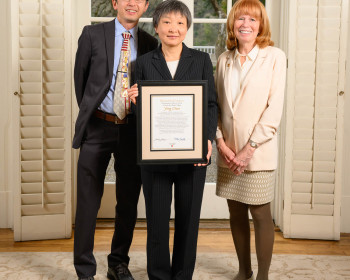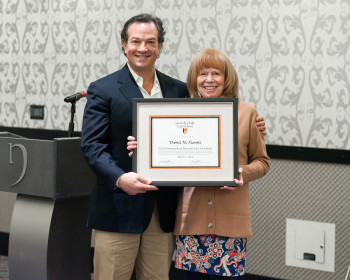CJRC and Local Nonprofit Forensic Justice Project, Work Together on New Clinic Project
Open gallery

The Criminal Justice Reform Clinic (CJRC) at Lewis & Clark Law School, together with the Forensic Justice Project (FJP), a local nonprofit in Portland, Oregon, is offering CJRC students a new clinical project centered around forensic science issues to begin in Spring 2020.
The new clinic project will give students the opportunity to do clinic work on FJP cases and projects, including educating the defense bar on forensic science issues and reviewing old cases for forensic issues, similar to the work which lead to the exoneration of Nick McGuffin in December 2019.
CJRC Director, Aliza Kaplan, and FJP founder, Janis Puracal, have worked together since 2014 when they founded the Oregon Innocence Project together. The two have kept in close contact throughout the years and have worked together on several projects and cases. In 2018, they wrote a law review article, It’s Not a Match: Why the Law Can’t Let Go of Junk Science, which proposed that states find ways to educate and assist defense lawyers on forensic science issues. This proposal became a reality in Oregon when the Forensic Justice Project was born.
FJP works with all public defense attorneys in Oregon on any matters related to forensic science at all stages of their cases. “If we don’t use science correctly on the front end, it can create fairness issues, but unvalidated or improper science is also one of the leading causes of wrongful convictions. That is why there is a need to both work on the front end with attorneys and provide education on different forensic sciences,” stated Kaplan.
“Aliza and I have been working together for many years, and I am so excited that she has joined FJP as Of Counsel,” Puracal said. “If we really want reform in this area, we need Aliza’s breed of expertise and ingenuity.”
“This work is ‘all hands on deck,’ and our interns are an important part of our ability to get it done,” stated Puracal. “Our work and our clients are counting on the interns to be a core part of the FJP team.”
The new clinic project will have its first student workers in Spring 2020. Spring clinic students working on this project will help write an amicus brief to the Ninth Circuit and work on a DNA education project for defense lawyers. “We are still thinking about how to use our clinic interns,” stated Kaplan. “But it’s really exciting to be personally involved in something so innovative and bringing clinic students into it as well; we also get to work with Janis, one of the smartest lawyers I have ever worked with.”
Students interested in applying for the CJRC clinic can learn more about the requirements here.
Law Communications is located in room 304 of Legal Research Center (LRC) on the law Campus.
MSC: 51
email jasbury@lclark.edu
voice 503-768-6605
Cell: 626-676-7923
Assistant Dean,
Communications and External Relations, Law School
Judy Asbury
Law Communications
Lewis & Clark Law School
10101 S. Terwilliger Boulevard MSC 51
Portland OR 97219

